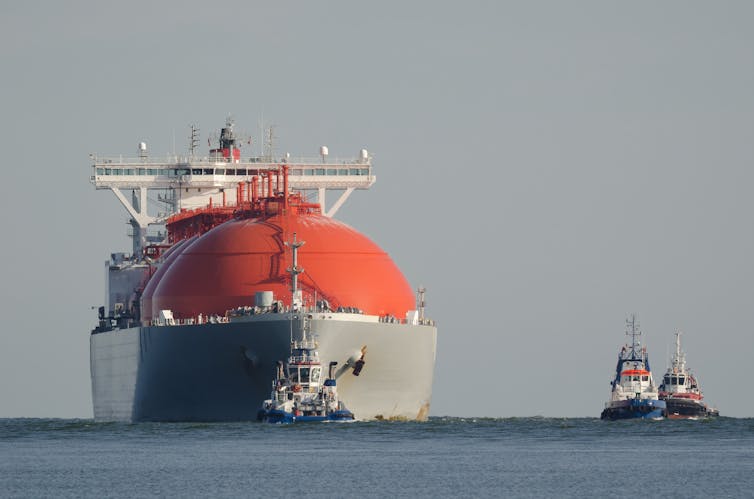The gas crisis is not over yet
By Michael Bradshaw, Warwick Business School, University of Warwick and Louis Fletcher, University of Warwick
Policy and luck have bought Europe a reprieve from the heights gas prices reached between the winters of 2022 and 2023, but prices are climbing again and the global gas market remains precariously balanced.
Rising tensions in the Middle East could upend it. If conflict spills into the Persian Gulf, it could disrupt shipments of liquefied natural gas (LNG) from Qatar that equal 20% of global exports.
We believe this winter will be the final act of the gas crisis. Here’s what we should expect.
Dangerously underprepared
The case for Britain to rapidly phase out natural gas in heating and power generation is overwhelming. It would unburden household bills of expensive gas imports and leave the country less vulnerable to energy supply crunches, while also cutting carbon emissions. Doing so will take time: as of today, the UK relies on gas for 37% of all energy consumption.
British households in particular are perilously exposed to gas prices. Directly, because four-fifths of households use gas for space heating. Indirectly, because in the UK, electricity prices are set by the price of gas-fired generation. After a decade of failed home insulation and energy-efficiency policies, the UK still has some of the draughtiest homes in Europe. It simply takes more energy to heat British homes, which lose heat three times faster than European neighbours.
Since the beginning of the recent crisis, the UK government has done little to change these facts. The end of the winter fuel payment to pensioners adds fresh concern. The Energy Crisis Commission recently found that the UK remains “dangerously underprepared” for a repeat of the gas price explosion of 2022-23.
All told, the UK cannot be oblivious to developments in the global gas market.
 Oleksandr Filatov/Shutterstock
Oleksandr Filatov/Shutterstock
A crisis in the making
Resurgent gas demand after the lifting of COVID restrictions led to a quadrupling of UK gas prices in 2021. Following Russia’s invasion of Ukraine in February 2022, Vladimir Putin throttled pipeline gas exports to Europe.
Europe turned to its greatest source of flexible gas supply: seaborne LNG. A price war for cargoes followed. The spending power of European economies pulled shipments away from low-income countries in Asia, such as Pakistan and Bangladesh, which caused crippling blackouts and a pivot to coal-fired generation.
Energy bills for an average household in the UK hit £4,279 in January 2023. The government protected consumers from the very worst at a cost of £51 billion in 2022-23, but the average household lost 8% of its budget to energy costs in 2022, rising to 18% for the poorest tenth of households. Roughly 2 million households on pre-payment meters were being cut off from their energy supply at least once a month at the height of the crisis.
Clement winters, moderate gas demand in Asia and successful measures to curb European gas demand saw UK gas prices fall from mid-2023. But they are still relatively high – at 48% above the average in the three years before Russia’s invasion of Ukraine.
One more winter
Could things get worse? Back in 2022, experts spoke of a “three-winter crisis” because significant new LNG export capacity (primarily in the US and Qatar) wasn’t expected until 2025. That has held true, and supply and demand in the global LNG market remains taut.
Several disturbances could destabilise this balance. The International Energy Agency expects that over 2024, global growth in gas demand will exceed the rate of growth in new LNG supply. Attacks on commercial vessels in the Red Sea by the Houthi militia in Yemen, in response to Israel’s invasion of Gaza, have rerouted LNG shipping routes. Cargoes that would have passed through the Suez Canal must now take the longer route around the Cape of Good Hope.
At the end of 2024, a major five-year agreement governing the transit of Russian gas through Ukraine will expire, and there is no prospect of renewal. Russian gas supplies to Europe will fall by around 5% of the EU’s total gas imports, or 65% of all gas imports into Austria, Hungary and Slovakia.
While Europe has been saved by mild winters over the last two years, this luck could break in 2024-25 according to some forecasts. Temperature – and the demand it creates for heating – will probably decide winter gas prices in Europe.
Geopolitical blowback
How might the worst-case scenario of conflict in the Persian Gulf happen?

Israel’s escalating military assaults on Hezbollah since September 17 have coincided with a 17% rise in UK gas prices. After Iran’s missile and drone strikes against Israel on October 1, European gas prices hit a new high for the year. This saw three LNG tankers destined for Asia change course mid-journey and head for Europe.
Israel has vowed retribution for the Iranian strike. Having obliterated Gaza and decapitated Hezbollah’s leadership, and with resolute material support from the US, Israel may now see Iran as vulnerable.
A severe response by Israel, targeting Iran’s nuclear facilities or oil infrastructure, would further up the ante. Wishing to avoid direct conflict, Iran could decide to target not Israel, but the flow of oil and gas through the Strait of Hormuz on which its western backers depend. Qatari LNG shipments through the strait account for 20% of global supply on their own.
Any interruption would also block Iran’s oil exports, afflict Iran’s friends as much as its foes, and kill Iran’s current reconciliation with the Gulf states. It is unlikely, but one would hope that the warning signs in the global gas market would remind western decision-makers that the conflict in the Middle East can continue to blow back on them.
Michael Bradshaw, Professor of Global Energy, Warwick Business School, University of Warwick and Louis Fletcher, Research Fellow in Energy and Climate Politics, University of Warwick
This article is republished from The Conversation under a Creative Commons license. Read the original article.

Don’t have time to read about climate change as much as you’d like?
Get our award-winning weekly roundup in your inbox instead. Every Wednesday, The Conversation’s environment editor writes Imagine, a short email that goes a little deeper into just one climate issue. Join the 40,000+ readers who’ve subscribed so far.![]()



